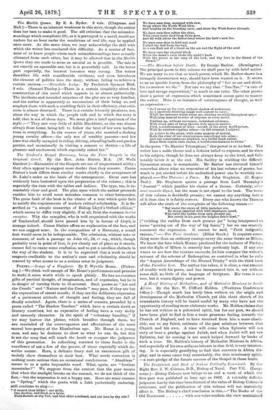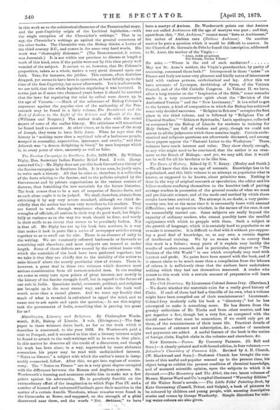The Pentateuch and Book of Joshua Critically Examined. By the
Right Rev. J. W. Colenso, D.D., Bishop of Natal. Part VII. (Long- mans.)—Bishop Colenso now brings to an end a work of which the first part was published as long ago as 1862. A tolerably definite judgment has by this time been formed of the value of Bishop Colenso's criticisms, and the publication of this volume will not materially affect it. The Bishop's chief conclusion is this,—" The Books of the
Old Testament with one voice confirm the view maintained
in this work as to the unhistorical character of the Pentateuchal story, and the post-Captivity origin of the Levitical legislation,—with the single exception of the Chronicler's writings." That is to say, the Chronicler's writings go against the general consensus of the other books. The Chronicler was, the Bishop thinks, a Levite of the third century B.C., and comes in for some very hard words. His work was " thoroughly dishonest." (The Deuteronomist, it seems, was Jeremiah.) It is not within our province to discuss at length a work of this kind, even if the public were not by this time pretty well wearied of the subject. It occurs to us, however, that Dr. Colenso's proposition, taken as a whole, makes a very great demand upon our faith. Take, for instance, the jubilee. This custom, often doubtless dropped, yet seems to have been in operation, at least fitfully, up to the time of the first Captivity, but never afterwards. Yet it is afterwards, we are told, that the whole legislation regulating it was invented. It seems just as if some two thousand years hence it should be asserted that the laws for regulating the trial by ordeal were drawn up in the age of Victoria.—Much of the substance of Bishop Colenso's argument against the popular view of the authorship of the Pen- tateuch may be found in a little volume, The Pentateuch and the Book of Joshua, in the Light of the Science and Morals of the Age. (Williams and Norgate.) The author deals also with the moral aspect of some of the earlier history. His criticisms will sometimes be found hard to answer. At other times, as in the case of the story of Joseph, they seem to have little force. When he says that the history is " nothing more than a mythical tale of a barbarous people, steeped in sensuality, superstition, ignorance, and cruelty," and that Jehovah was " a demon delighting in blood," he uses language which is, in every point of view, unseemly as well as false.



































 Previous page
Previous page